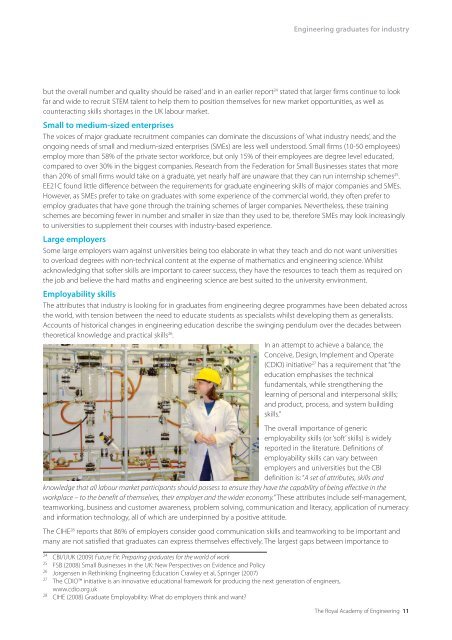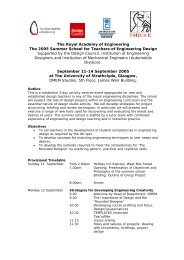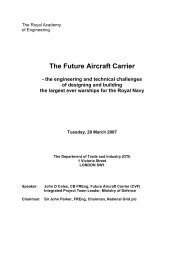Engineering graduates for industry - Royal Academy of Engineering
Engineering graduates for industry - Royal Academy of Engineering
Engineering graduates for industry - Royal Academy of Engineering
You also want an ePaper? Increase the reach of your titles
YUMPU automatically turns print PDFs into web optimized ePapers that Google loves.
<strong>Engineering</strong> <strong>graduates</strong> <strong>for</strong> <strong>industry</strong><br />
but the overall number and quality should be raised’ and in an earlier report 24 stated that larger firms continue to look<br />
far and wide to recruit STEM talent to help them to position themselves <strong>for</strong> new market opportunities, as well as<br />
counteracting skills shortages in the UK labour market.<br />
Small to medium-sized enterprises<br />
The voices <strong>of</strong> major graduate recruitment companies can dominate the discussions <strong>of</strong> ‘what <strong>industry</strong> needs’, and the<br />
ongoing needs <strong>of</strong> small and medium-sized enterprises (SMEs) are less well understood. Small firms (10-50 employees)<br />
employ more than 58% <strong>of</strong> the private sector work<strong>for</strong>ce, but only 15% <strong>of</strong> their employees are degree level educated,<br />
compared to over 30% in the biggest companies. Research from the Federation <strong>for</strong> Small Businesses states that more<br />
than 20% <strong>of</strong> small firms would take on a graduate, yet nearly half are unaware that they can run internship schemes 25 .<br />
EE21C found little difference between the requirements <strong>for</strong> graduate engineering skills <strong>of</strong> major companies and SMEs.<br />
However, as SMEs prefer to take on <strong>graduates</strong> with some experience <strong>of</strong> the commercial world, they <strong>of</strong>ten prefer to<br />
employ <strong>graduates</strong> that have gone through the training schemes <strong>of</strong> larger companies. Nevertheless, these training<br />
schemes are becoming fewer in number and smaller in size than they used to be, there<strong>for</strong>e SMEs may look increasingly<br />
to universities to supplement their courses with <strong>industry</strong>-based experience.<br />
Large employers<br />
Some large employers warn against universities being too elaborate in what they teach and do not want universities<br />
to overload degrees with non-technical content at the expense <strong>of</strong> mathematics and engineering science. Whilst<br />
acknowledging that s<strong>of</strong>ter skills are important to career success, they have the resources to teach them as required on<br />
the job and believe the hard maths and engineering science are best suited to the university environment.<br />
Employability skills<br />
The attributes that <strong>industry</strong> is looking <strong>for</strong> in <strong>graduates</strong> from engineering degree programmes have been debated across<br />
the world, with tension between the need to educate students as specialists whilst developing them as generalists.<br />
Accounts <strong>of</strong> historical changes in engineering education describe the swinging pendulum over the decades between<br />
theoretical knowledge and practical skills 26 .<br />
In an attempt to achieve a balance, the<br />
Conceive, Design, Implement and Operate<br />
(CDIO) initiative 27 has a requirement that “the<br />
education emphasises the technical<br />
fundamentals, while strengthening the<br />
learning <strong>of</strong> personal and interpersonal skills;<br />
and product, process, and system building<br />
skills.”<br />
The overall importance <strong>of</strong> generic<br />
employability skills (or ‘s<strong>of</strong>t’ skills) is widely<br />
reported in the literature. Definitions <strong>of</strong><br />
employability skills can vary between<br />
employers and universities but the CBI<br />
definition is: “A set <strong>of</strong> attributes, skills and<br />
knowledge that all labour market participants should possess to ensure they have the capability <strong>of</strong> being effective in the<br />
workplace – to the benefit <strong>of</strong> themselves, their employer and the wider economy.” These attributes include self-management,<br />
teamworking, business and customer awareness, problem solving, communication and literacy, application <strong>of</strong> numeracy<br />
and in<strong>for</strong>mation technology, all <strong>of</strong> which are underpinned by a positive attitude.<br />
The CIHE 28 reports that 86% <strong>of</strong> employers consider good communication skills and teamworking to be important and<br />
many are not satisfied that <strong>graduates</strong> can express themselves effectively. The largest gaps between importance to<br />
24<br />
CBI/UUK (2009) Future Fit: Preparing <strong>graduates</strong> <strong>for</strong> the world <strong>of</strong> work<br />
25<br />
FSB (2008) Small Businesses in the UK: New Perspectives on Evidence and Policy<br />
26<br />
Jorgensen in Rethinking <strong>Engineering</strong> Education Crawley et al, Springer (2007)<br />
27<br />
The CDIO initiative is an innovative educational framework <strong>for</strong> producing the next generation <strong>of</strong> engineers,<br />
www.cdio.org.uk<br />
28<br />
CIHE (2008) Graduate Employability: What do employers think and want?<br />
The <strong>Royal</strong> <strong>Academy</strong> <strong>of</strong> <strong>Engineering</strong> 11

















